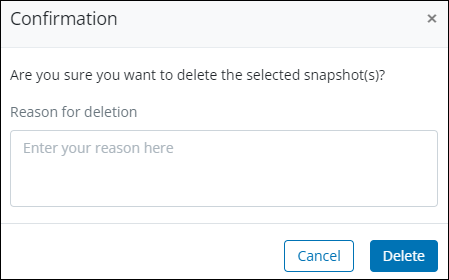Know your SharePoint dashboard
The SharePoint dashboard lists all the discovered SharePoint sites. This topic explains the dashboard in detail and the actions you can perform on it.
Access path
To access the SharePoint dashboard, sign in to inSync Management Console and navigate to Microsoft 365 > SharePoint.
The SharePoint dashboard has three tabs.
- All Sites
- Configured Sites
- Settings
This tab lists all SharePoint sites along with details such as site title, type, URL, type (Microsoft Teams Site, Microsoft 365 Group Site, MS Teams Private Channel Site, Other Site), and configuration status.
You can perform the following actions on the All Sites tab.
- Configure backup settings for SharePoint sites
- Manually discover the newly added sites
- Delete the selected site
- Search a site based on its title or URL
- Filter sites based on the site type and configuration status
- View or hide table columns
- View the sites list in full-screen mode
This tab lists Configured Sites with Title, Site Type, Last Completed backup, Backup Data, App Status, Last Backup Status (Completed Successfully, Failed, Completed with Errors, Never Backed up), and error (error code indicating the reason and solution for SharePoint Site data backup failure).
On this tab, you can:
- Manually back up a site
- Restore data for the selected site
- Enable a site for backup
- Disable a site for backup
- Delete a site
- Download the failed item list
- Filter the Teams list based on Site Type, Last Backup Status, App Status, and error.
You can perform the following actions on the Settings tab.
- Define auto-configuration settings for SharePoint sites backup
- Modify the default or custom backup settings
The dashboard lists all the configured and non configured SharePoint sites.
- When you click any non-configured SharePoint site, the Configure for Backup window is displayed.
- When you click any configured SharePoint site, the Summary page is displayed.
Summary
- ►The Summary page gives you an overview of the selected site’s backup details.
-
Field
Description
Site Details
View the selected SharePoint site details such as its title, type, status, date and time when it was added, M365 geo location, storage region, its site URL.
Storage consumption
Analyze the backup storage consumption in the last 90 days.
The storage consumption section shows how the storage consumption for the SharePoint site has changed over the last 90 days. When you hover the mouse pointer over a particular place in the chart, you can see the storage consumed on a day.
Backup Summary
View backup summary that includes details such as last completed backup, last backup status, last backup data, and total backup data.
Backup Settings
Specifies whether custom or default backup settings are applied. Click Edit to modify the custom settings.
On this tab, you can:
- Backup Now - Manually backup the selected site’s data.
- Restore Data - Manually restore the data for the selected SharePoint site.
- Enable - Enable backup for the selected SharePoint site.
- Disable - Disable backup for the selected SharePoint site.
Note: For SharePoint sites with the Disabled status, you cannot perform backup operation. However, you can do the following:- View the snapshots or restore points
- Download data
- View activity logs
- Edit - Modify or update the existing Backup Settings for the selected SharePoint site.
Backups
The backups tab displays the summary of total snapshot(s) captured, time stamp for latest and oldest recovery points. Here, You can delete maximum 20 snapshots at a time.
- Sign in to Druva Cloud Platform Console and navigate to Microsoft 365 > SharePoint Online.
- Click the user of which you want to delete the snapshot.
- Go to the Backups tab, select the snapshot(s) that you want to delete and then click the Delete Snapshot button.
- Enter the reason for deletion and click Delete. (The reason is mandatory with a character limit between 10-150. The reason for deletion will be captured in the Admin Audit trail for auditing purposes.)

Snapshot(s) deleted successfully message displays.
Notes:
- The SharePoint Online snapshot(s) will be deleted temporarily. You can rollback the deleted SharePoint Online snapshot(s) within a configurable rollback window. After the rollback window expires, the SharePoint Online snapshot(s) will be deleted permanently. See Rollback Actions for details.
- To use Rollback Actions, you need the Security Essentials license. Contact Support to obtain the license. Currently, this feature is available only for Druva Public Cloud customers.
Activity Stream
The Activity Stream tab displays the current progress of ongoing backup or restore activities of all SharePoint sites.
This tab lists the Backup activity logs for the SharePoint site as follows:
- Backup activities: Displays a list of backup activity logs that are less than 30 days old.
Note: inSync automatically deletes the backup activity logs which are more than 30 days old. - Download and Restore activities - All the Download and Restore activities performed to date are displayed.
Note: inSync does not delete the download and restore activity logs.
You can perform the following actions on the Activity Stream tab.
- Download and view the logs of the backup and restore activities performed for the selected SharePoint site.
- Filter the logs based on Activity, Time, and Status.

